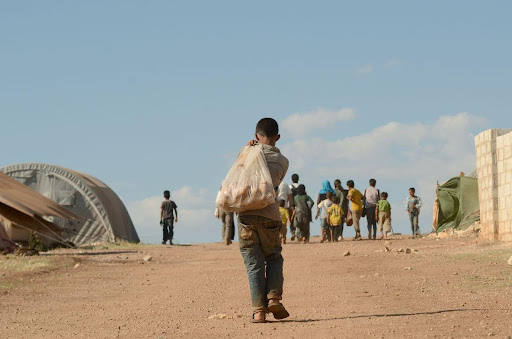Humanitarian Research
Innovative Humanitarian Solutions
The Institute of International Humanitarian Affairs innovates solutions to complex humanitarian challenges through collaborative research and exploration. IIHA Research Fellows contribute to the knowledge of our undergraduate students, the mainstream media, and the general public through events, press engagement, and academic publishing.
The Institute works alongside government entities, non-governmental organizations, like-minded academic institutions, and the private sector to address some of today’s most pressing humanitarian challenges.
Current Research Initiatives

Watchlist on Children and Armed Conflict and Fordham University’s Institute of International Humanitarian Affairs (IIHA) are pleased to share their new joint policy paper, Denial of Humanitarian Access for Children: Legal, Policy, and Operational Challenges.
The policy paper examines the international legal framework on denial of humanitarian access as it applies to children; the impact of counterterrorism measures, sanctions regimes, and donor conditionality clauses affecting humanitarian access for children; the various forms of denial of humanitarian access and their consequences on children, including emerging obstacles such as the COVID-19 pandemic; the challenges of monitoring and reporting on the denial of humanitarian access in the context of the UN’s CAAC mandate; and the potential risks and opportunities of making the denial of humanitarian access a trigger for listing perpetrators in the Secretary-General’s annual report on children and armed conflict. The paper concludes with a series of recommendations directed to the UN and its Member States, donors, and the humanitarian community, to influence normative and policy change.
2022 Research Initiatives
-
At a time of heightened and prolonged global calamity, humanitarian actors persistently strive to design sustainable relief and recovery operations that restore dignity and foster resilience of affected populations. Similarly, a growing community of designers from diverse disciplines - ranging from the built environment and emergency architecture to product and graphic design - endeavor to contribute their skills for social change and humanitarian action.
In partnership with the International Organization for Migration (IOM), the IIHA explores the intersection of design and humanitarian action through the multi-year Design for Humanity Initiative for more dignified and sustainable humanitarian design.
Humanitarian Design Fellow
Alberto Preato
Alberto Preato is the Senior Regional Program Coordinator at the International Organization for Migration Regional Offices for South America, Buenos Aires. He received a Master’s Degree in Sustainable Emergency Architecture at the Universidad Internacional de Catalunya in Barcelona and holds a Master in Sustainable Architecture at the Università IUAV (Venice, Italy). Alberto Preato has been on the frontline of some of the most challenging humanitarian responses to natural disaster and complex crises. He has been deployed to Mozambique, Colombia, Haiti, Honduras, Vanuatu, Fiji and Niger. At the IIHA, Alberto works with designers and humanitarians to research and present innovative design solutions that better respond to the needs of crisis-affected populations.
-
Blockchain for Humanity
The Blockchain for Humanity Initiative led by the Institute of International Humanitarian Affairs aimed to create a platform for technology experts, scholars and humanitarian practitioners to identify, discuss and recommend policies concerning the application of blockchain technology for humanitarian action.
The Blockchain for Humanity Initiative aimed to:
- Highlight a range of piloted and pioneered blockchain initiatives for humanitarian action
- Facilitate the ethical adoption of humanitarian blockchain solutions in response to technical, legal, and governance challenges facing the humanitarian sector
- Connect professionals from across sectors to foster new partnerships, encourage technical collaboration, and explore nontraditional funding sources
- Assemble a database of blockchain initiatives that respond to the technical, legal, and governance challenges in the humanitarian field
- Build a digital community of developers interested in impacting humanitarian assistance
The Institute of International Humanitarian Affairs held two Humanitarian Blockchain Summits.
In 2017, the Humanitarian Blockchain Summit focused on pilot projects paving the road of blockchain in the humanitarian and development sector. In 2018, the Summit focused on blockchain infrastructure, exploring the role and potential of the different platforms in shaping future applications. The Summits facilitated engagement between major humanitarian and development actors and blockchain platform experts from companies like Ethereum, Hyperledger, Iota, and others.
Humanitarian Innovation Fellow
Giulio Coppi
Giulio Coppi joins the IIHA with more than ten years of humanitarian professional experience managing operations in South America, West and Central Africa, South and Central Asia. Giulio earned his BA, MA and MAS in International Law with a specialization on Humanitarian Law and Human Rights in conflict. In his career, Giulio has cooperated with NGOs, Universities, the UN, the OECD and the ICRC. At the IIHA, Giulio oversees the Humanitarian Innovation program of the Institute, with a special focus on Open Source technology and community-based approaches. For this purpose, Giulio fosters relationships with all relevant interlocutors from the non-profit, private, and public sector alike in order to create broad partnerships and to promote a meaningful public debate on the global right of access to life-saving technology. Giulio is also the founder and administrator of the platform High Tech Humanitarians (HTH), of which IIHA is an official partner. HTH is a web based initiative dedicated to the gathering and improvement of open source humanitarian tools, to allow universal access to life-changing technology and to mark the beginning of a continuous bottom-up innovation process.
Please check back soon for our 2024 research initiatives. In the meantime, we invite you to take a look at our previous initiatives. Follow us on your favorite social media channel for updates.